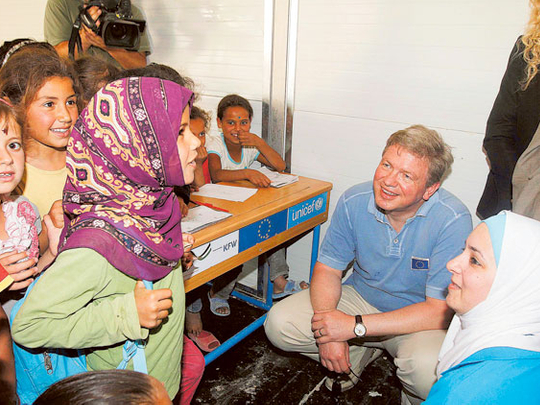
London: The British and French governments have said that medical samples smuggled out of Syria have tested positive for the nerve agent sarin, and added they have shown the evidence to a UN investigation.
The British Foreign Office confirmed that body fluids collected from victims of one or more attacks in the country were found to contain a chemical fingerprint of sarin at a UK Ministry of Defence’s facility. In Paris, the French foreign minister, Laurent Fabius, said he had passed similar evidence to the head of the UN inquiry into chemical weapon use in Syria, Ake Sellstrm.
“On France’s behalf, I handed him the results of the analyses carried out by our laboratory, chosen by the Organisation for the Prohibition of Chemical Weapons to identify military toxins,” Fabius said. “These analyses demonstrate the presence of sarin gas in the samples in our possession. In view of this evidence, France is now certain that sarin gas has been used in Syria several times and in a localised manner. “We decided to inform the relevant UN mission of the evidence in our possession, immediately and publicly. It would be intolerable for those guilty of these crimes to enjoy impunity.”
The French television channel, Europe 1, reported that blood samples brought back from Syria by French journalists and others acquired by the French military showed sarin was used in a sophisticated cocktail of chemicals.
Le Monde reported that the samples tested included urine brought back by Le Monde journalists from Jobar on the outskirts of Damascus between 12 and 14 May. Other samples included blood taken after a Syrian government helicopter attack in Saraqeb, south of Homs on 29 April.
Appearing on French TV news, Fabius said France had no doubt that the gas was used and that in the second case, there was no doubt it was used by the regime and its accomplices as there was evidence all the way along the chain.
He added that a line had been crossed and Paris would speak to Washington and London about how to react, saying that “all the options are on the table”.
Fabius did not rule out an armed reaction in relation to places where the gas was stocked but cautioned France was not at that point. He said it was crucial that the international conference in Geneva in July aimed at peace negotiations must not be affected by France’s reaction. British officials, who say that Sellstrm and his team have visited the UK three times to analyse and discuss the evidence, concede that it will be very hard to prove the Al Assad regime was to blame without UN investigators being able to visit the Syrian battlefield. But they insist that all the circumstantial evidence points towards the government.
A senior British official said: “Are we confident in our means of collection, and are we confident that it points to the regime’s use of sarin? Yes. Can we prove it with 100 per cent certainty? Probably not.”
The Foreign Office confirmed that “physiological samples” collected inside the country had tested positive for sarin after the Guardian learned of the results from other sources. “We have obtained physiological samples from inside Syria which have been tested at the Porton Down facility, and they tested positive for sarin,” an FCO spokesman said.
William Hague, the foreign secretary, said: “We welcome the decision by France to share information related to samples from Syria with the UN investigation so that the full facts are established around allegations of chemical weapons use in Syria. This announcement adds further weight to the need for a full and unimpeded investigation into all relevant incidents. The UN investigation team must be allowed unrestricted access to investigate on the ground in Syria and we call on the Al Assad regime to fully cooperate with it.”
A senior Turkish official also claimed his country had collected its own samples from victims of chemical attacks in Syria and had also concluded that the regime had used sarin in small quantities.
Sarin can be detected in blood and urine if samples are taken soon after an attack, but the chemical is volatile and quickly degrades into other compounds. One of these by-products is considered to be clear proof of sarin exposure, chemical weapons inspectors and scientists said.
The British Foreign Office would not confirm where or when the samples were collected, but British evidence of chemical attacks passed to the UN cites incidents in Homs in December, Aleppo and Adra, near Damascus, in March, and in Darayya, also near Damascus, and Saraqib, near Aleppo, in April.
A senior UK official said it appeared possible that Syrian army commanders had been given the green light by the regime to use sarin in small quantities.
The Syrian president, Bashar Al Assad, invited the UN to investigate the Aleppo attack, which it blames on rebel forces. But inspectors have been refused entry since the UN secretary general, Ban Ki-moon, insisted the visit covered any and all alleged incidents. The team is now gathering evidence from sources outside the country.
Barack Obama has warned Syria that use of chemical weapons crosses a “red line”, though his concerns centred on “seeing a whole bunch of weapons moving around or being utilised”. To date, only small quantities are believed to have been used.












